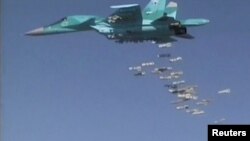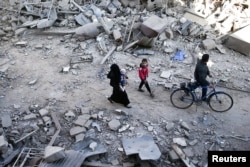The U.S. military has given Russia advanced notice of airstrikes in Syria about five times per month since a U.S.-led coalition strike in September killed Syrian government-aligned forces near Deir Ezzor, a military official told VOA Wednesday.
Speaking on condition of anonymity, the official with U.S. Central Command, which carries out counter-Islamic State operations in the Middle East, said that in those "exceptional" cases, Americans called the Russians on a safety hotline to give them airstrike locations in relation to their distance from the center of a nearby city.
The safety hotline was initially set up to avoid midair collisions between Russian and coalition aircraft flying in Syrian airspace. Brig. General Richard Coe told reporters Tuesday that the September 17 coalition strike near Deir Ezzor was the first time the coalition relayed a strike location to the Russians ahead of time.
Officials say advanced notice was given to the Russians on September 17 to prevent any "miscalculation," due to the large number of coalition planes involved in that strike and the fact that Russian planes often fly into an airfield in Deir Ezzor.
"If we have an operation where the Russians or Syrians are operating in the air or on the ground, we're going to make that phone call to deconflict," a Central Command official told VOA.
The Russians were first to use the hotline to give advanced notice about a strike, according to the official. One notification from Russia came prior to September 17, and it has used the hotline to notify the coalition about two strikes since the deadly Deir Ezzor strike.
In at least two of Russia's advanced notifications, a strike location was relayed as being in an area over a Syrian city, rather than providing exact distances from a city.
A U.S. defense official said the coalition must ensure that the hotline with Russia remains used to “deconflict,” rather than to coordinate.
"From a mil-to-mil [military-to-military] standpoint, more communication is better than less, so we're doing as much as we can within the bounds of policy," the defense official told VOA.
The U.S.-led coalition typically conducts hundreds of strikes against Islamic State in Syria each month.





